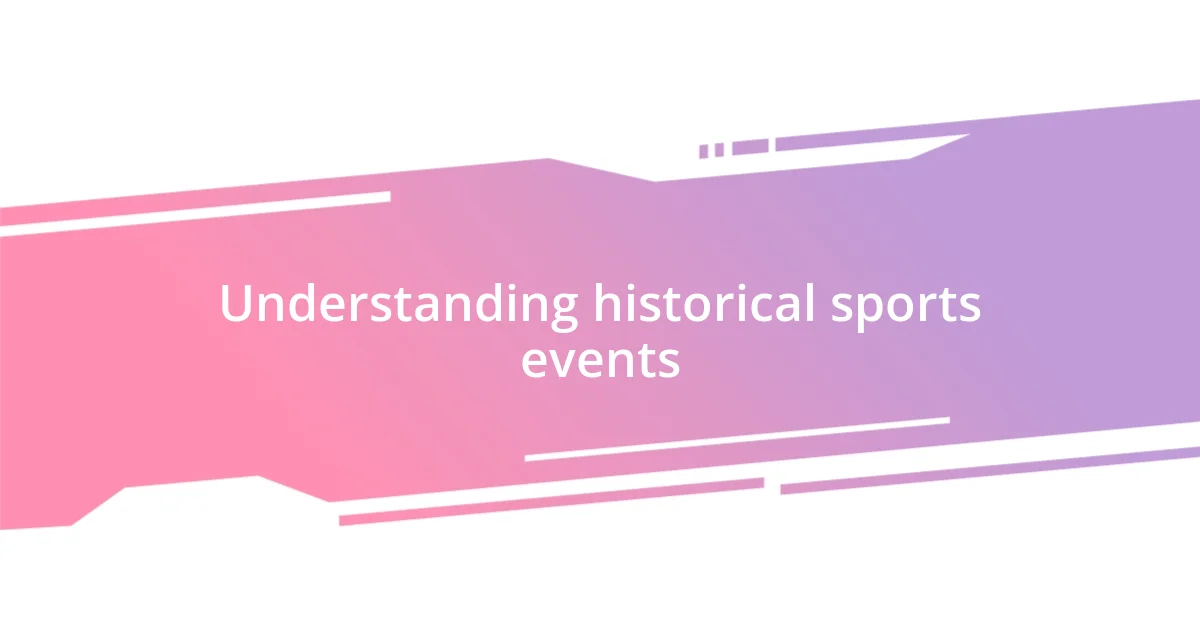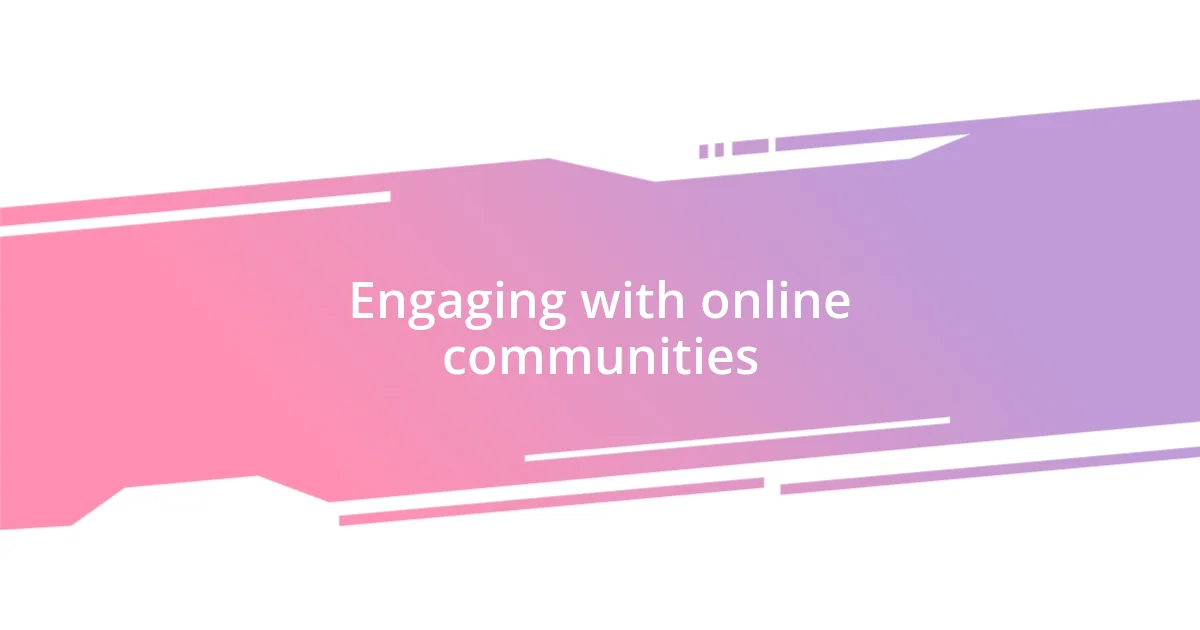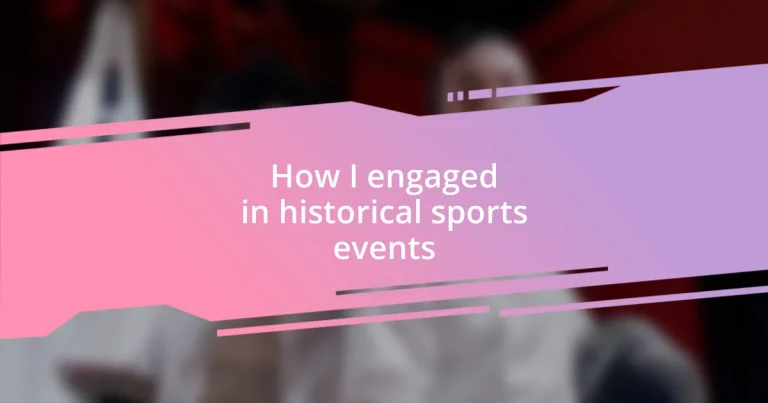Key takeaways:
- Historical sports events serve as reflections of cultural values and societal struggles, connecting generations through shared experiences and memories.
- Engaging in research, local reenactments, and online communities deepens appreciation and understanding of these events, revealing their emotional significance beyond mere statistics.
- Documenting experiences and sharing insights fosters a sense of belonging and highlights the power of storytelling in connecting individuals with the rich history of sports.

Understanding historical sports events
When I think about historical sports events, I can’t help but feel a rush of nostalgia. These moments in time are not just games; they’re stories of perseverance. For instance, the 1980 Miracle on Ice, where the underdog U.S. hockey team defeated the heavily favored Soviet Union, always hits home for me. It wasn’t just a victory; it was a symbol of hope during a trying period in history.
Understanding these events means appreciating the cultural and societal contexts in which they occurred. Have you ever considered how a single match can reflect the values and struggles of an entire nation? For instance, the impact of the 1968 Olympics, where Tommie Smith and John Carlos raised their fists in a Black Power salute, reverberated far beyond the track. To me, this act of defiance and solidarity was much more than an athletic demonstration; it was a bold statement in the fight for civil rights that still resonates today.
Historical sports events also allow us to connect with our roots and the emotions of those who experienced them firsthand. I remember hearing my grandfather talk about his excitement watching the 1954 World Series; it was as if he relived every moment with the same enthusiasm. Can you feel the emotional weight carried through generations when family stories intertwine with significant sports milestones? It’s fascinating how these memories build a bridge across time, connecting us to our shared human experience.

Researching significant historical events
Diving into the research of significant historical sports events can be quite an adventure. I remember the first time I explored the aftermath of the 1969 World Series – it wasn’t just about the game itself, but how it brought New York and Boston together in a unique rivalry that shaped future seasons. I found myself lost in archives, pouring over headlines and old photographs, which turned the statistics into stories filled with triumph and heartache.
To make the most of your research, consider these steps:
- Identify key events that resonate personally or culturally.
- Utilize various resources like interviews, news articles, and documentaries for diverse perspectives.
- Explore the sociopolitical atmosphere surrounding the event for a richer context.
- Take notes on personal anecdotes that relate to the events for a more compelling narrative.
- Engage in discussions with others who share your interest to gain different insights.
Finding connections to the past through these events can lead to a deeper appreciation of both history and the human spirit.

Exploring my personal connections
When I reflect on my personal connections to historical sports events, I recall sitting in my living room with my family, glued to the television during the 1994 World Cup. The energy in our home was electric, transcending the mere act of watching a game. Each goal scored felt like a celebration that echoed through our small town, unifying neighbors and igniting conversations that lasted well beyond the final whistle.
There’s something deeply moving about how these moments intertwine with our lives. I’ll never forget my visit to a local sports memorabilia store, where an old jersey from the 1985 Chicago Bears caught my eye. The nostalgia flooded in as the store owner shared stories of legendary plays and his own experiences watching the games back in the day. It was a reminder that these events are not just historical milestones; they create a tapestry of memories that links generations, sparking joy, pride, and sometimes even heartache.
As I engage further with these historical events, I find that personal stories often drive my connection. For instance, during a casual game of pickup basketball with friends, we often reminisced about Michael Jordan’s iconic moments in the 90s. The way we celebrated his legacy over a game showed me that sports can evoke powerful emotions, weaving together laughter, competition, and a sense of belonging that turns reminiscence into a shared experience.
| Historical Event | Personal Connection |
|---|---|
| 1994 World Cup | Family gatherings and community spirit |
| 1985 Chicago Bears | Connecting with local memorabilia and nostalgia |
| Michael Jordan’s Legacy | Friendship and shared memories during basketball games |

Participating in local reenactments
Participating in local reenactments has been an eye-opening experience for me. I remember donning a wool uniform during a Civil War reenactment, feeling the weight of history press down as I marched alongside fellow history enthusiasts. It was surreal, as every cannon blast echoed like a reminder of the sacrifices made, and I truly grasped the significance of those moments shared.
What’s fascinating is how these reenactments breathe life into stories that textbooks often make feel distant and abstract. I’ll never forget a local event centered around a historic baseball game from the early 20th century. Friends and I gathered to recreate the atmosphere of the day, complete with period-appropriate gear and vintage-style hot dogs. As we played under the sun, laughter filled the air, mingling with shouts of joy and friendly competition. Each swing of the bat and cheer connected us to our town’s past, igniting a sense of community that felt vibrant and alive.
Looking back, I often wonder: how does participating in these reenactments shape our understanding of history? For me, it became clear that embodying a historical figure or community member creates a personal bond to those events. It’s not just about observation; it’s about immersion. Walking in the footsteps of those who came before us not only deepens our appreciation for their struggles and triumphs but also helps preserve those stories for future generations. Through my experiences, I have been reminded that history is not just a collection of dates and facts; it is a living narrative waiting to be celebrated and remembered.

Engaging with online communities
Engaging with online communities has transformed my connection to historical sports events in ways I never anticipated. I recall joining a forum dedicated to the 1972 NBA Finals, where fans dissected every game, sharing personal anecdotes and cherished memories. The conversations weren’t just about stats; they were filled with passion, revealing how these matches shaped our lives, creating a sense of camaraderie that transcended geographic boundaries.
The thrill of virtual discussions often felt like sitting around a table with friends, laughing and debating late into the night. One time, I participated in a live tweet-along of a historical game broadcast, interacting with others who shared their favorite plays and thoughts in real-time. It brought the past to life in a unique way, as if we were all experiencing those moments together again. I often find myself asking, how can such a digital connection evoke such real emotions? The answer lies in our shared love for sports, which transcends the screen.
Social media platforms, too, have become vibrant spaces where I engage with like-minded fans. I remember spilling out my excitement over a TikTok video that showcased highlights from the 1985 Super Bowl. The comments section erupted with nostalgia, and suddenly, I was enveloped in a community celebrating the triumphs and heartaches of our favorite teams. It’s incredible how these online interactions can evoke such visceral responses, making the past feel immediate and alive in our daily lives.

Documenting my experiences
Documenting my experiences in engaging with historical sports events has been a journey filled with excitement and reflection. I vividly remember the first time I participated in a local reenactment; I was struck by the palpable energy in the air. The smell of freshly cut grass and the crack of the bat brought back memories of my childhood, playing baseball in my backyard with friends. How amazing is it that playing a vintage game can connect us to generations past?
I took to journaling about each event I attended, capturing not just the facts, but the feelings swirled around those moments. I’d find myself writing late at night, reliving the sounds of cheer from the stands or the heat of competition from the field. One particular entry about a vintage football match made me appreciate how visceral the experience was—feeling the grass underfoot, the shout of players echoing in my ears. It made me realize: isn’t it incredible how a simple game can evoke such a sense of belonging and history?
Flipping through my journal now, I often find snippets of conversations and laughter shared with fellow enthusiasts. There’s a written memory of discussing strategy over a picnic table with strangers who became friends, united by a love for the sport. I’ve contemplated why these moments resonate so strongly with me. Perhaps it’s the shared experience and the stories that intertwine our lives, as if we all become part of a larger historical narrative. Documenting my experiences does not merely preserve memories; it enriches my understanding and appreciation for the sports that shape our culture.

Sharing insights and learnings
Reflecting on my interactions with these historical sports events, I’ve gained profound insights into the ways they shape not only our culture but also our sense of identity. For instance, when I stumbled across a book on early Olympic Games, I was captivated by how athletes in ancient Greece viewed competition as a form of personal excellence. It made me ponder: how much of our modern sportsmanship is rooted in that ancient understanding? I found myself connecting the dots between those early ideals and how I see sports today—an engine for perseverance and community.
Another memorable moment came during an online discussion about the impact of the 1969 World Series. As I shared my thoughts, others recounted how their families gathered for those games, forming traditions that now span generations. I felt a sense of warmth, realizing that these events are more than games; they’re woven into the very fabric of our lives. Isn’t it fascinating how these shared histories create bonds that last long after the final whistle?
Engaging with others has taught me that each event carries not only statistical significance but emotional weight as well. I recall listening to a podcast where a fan recounted his father’s stories of watching the ’86 World Series, and it struck me just how intertwined sports and memory can be. Each cheer, each heart-wrenching moment becomes a thread in the tapestry of our lives. This realization has opened my eyes to the power of storytelling in sports, inspiring me to explore how our collective narratives enhance our appreciation for the games we love.














